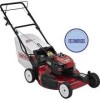Craftsman 37624 Owners Manual - Page 11
See Storage
 |
View all Craftsman 37624 manuals
Add to My Manuals
Save this manual to your list of manuals |
Page 11 highlights
_IL CAUTION: Wipe off any spilled oil or fuel. Do not store, spill or use gasoline near an open flame. _, CAUTION: Alcohol blended fuels (called gasohol or using ethanol or methanol) can attract moisture which leads to separation and formation of acids during storage. Acidic gas can damage the fuel system of an engine while in storage. To avoid engine problems, the fuel system should be emptied before storage of 30 days or longer. Empty the gas tank, start the engine and let it run until the fuel lines and carburetor are empty. Use fresh fuel next season. See Storage Instructions for additional information. Never use engine or carburetor cleaner products in the fuel tank or permanent damage may occur. Engine oil cap Gasoline filler cap Primer TO STOP ENGINE • To stop engine, release operator presence control bar. TO START ENGINE NOTE: Due to protective coatings on the engine, a small amount of smoke may be present during the initial use of the product and should be considered normal. 1. To start a cold engine, push primer three (3) times before trying to start. Use a firm push. This step is not usually necessary when starting an engine which has already run for a few minutes. 2. Hold operator presence control bar down to the handle and turn the start key. IMPORTANT: Do not crank engine more than five continous seconds between each time you try to start. Wait 5 to 10 seconds between each attempt. • To start engine using the rope starter, follow the steps above. Exchange the use of the starter rope for start key. Pul! starter handle quickly. Do not allow starter rope to snap back. NOTE: In cooler weather it may be necessary to repeat priming steps. In warmer weather over priming may cause flooding and engine wil! not start. If you do flood engine wait a few minutes before attempting to start and do not repeat priming steps. 11















